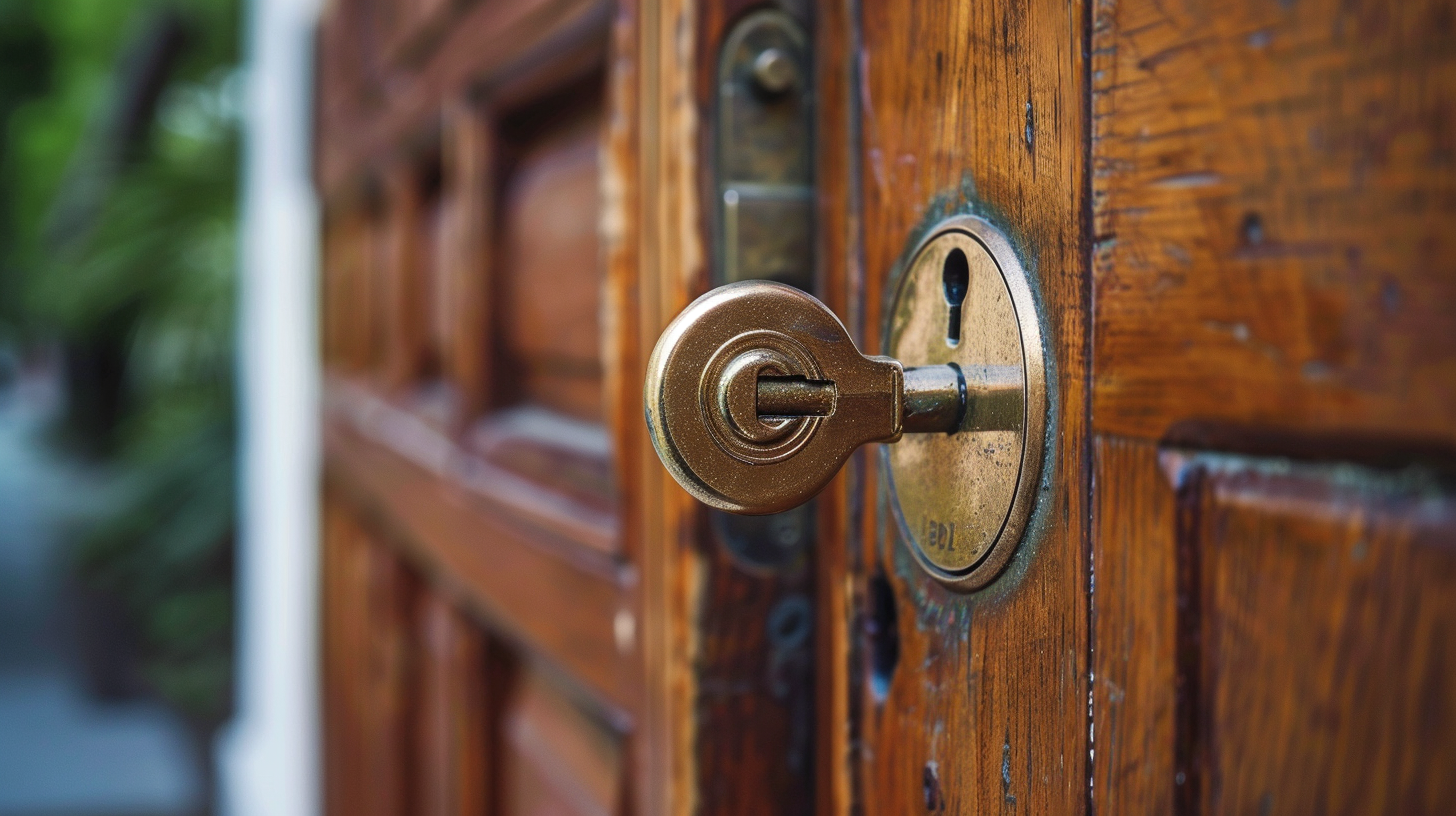Why and When to Rekey Locks in Your Home
Ensuring the security of your home is a fundamental aspect of maintaining a safe living environment. One crucial yet often overlooked aspect of home security is the rekeying of locks. Rekeying locks is a process that involves altering the internal mechanism of a lock so that it works with a new key. This procedure is distinct from changing locks, where the entire lock is replaced. Understanding why and when to rekey locks can greatly enhance your home’s security and provide peace of mind.
About Rekeying Locks
Rekeying a lock involves adjusting the internal pins and tumblers within the lock mechanism so that the old key no longer works, and a new key is required to operate the lock. Unlike replacing a lock, which involves installing a completely new locking mechanism, rekeying is a more cost-effective solution that allows you to maintain your existing hardware while ensuring that only authorized keys will work.
The primary reason for rekeying locks is to improve security by preventing unauthorized access. This might be necessary in various situations, ranging from moving into a new home to dealing with lost keys or changes in household dynamics.
Reasons to Rekey Locks
Lost or Stolen Keys
One of the most pressing reasons to rekey your locks is when keys are lost or stolen. If a key is misplaced or taken, there is a risk that someone could potentially gain access to your home. Immediate rekeying can mitigate this risk by ensuring that the old key will no longer work, thus protecting your property from unauthorized access.
When dealing with lost or stolen keys, it is important to act quickly. The longer you wait, the greater the chance that the key may fall into the wrong hands. Rekeying your locks offers a straightforward solution to safeguard your home.
Moving into a New Home
Rekeying locks is strongly recommended when you move into a new home. Even if the property appears secure, there is no way to know how many copies of the key exist or who might still have access. Previous owners, real estate agents, or contractors may have retained copies of the keys, which poses a potential security risk.
By rekeying the locks, you ensure that only you and those you authorize can access your home. This step is crucial for new homeowners or renters looking to secure their new living space from day one.
Key Control Issues
Key control is another significant reason to consider rekeying your locks. Over time, keys may be duplicated and distributed to various individuals, such as family members, friends, or service personnel. Each additional copy increases the risk of unauthorized access, especially if the key falls into the wrong hands.
Rekeying locks allows you to regain control over who has access to your home. By updating the key configuration, you can limit access to only those who currently need it, thereby enhancing your home’s security.
Recent Break-In or Attempted Break-In
If your home has recently been the target of a break-in or an attempted break-in, rekeying your locks should be a top priority. Even if the intruders did not gain entry, the fact that they attempted to access your home indicates a potential vulnerability in your security measures.
Rekeying the locks after such an incident can provide a sense of increased security and peace of mind. It ensures that any keys potentially used by the intruders are rendered useless, thus fortifying your home against future attempts.
Changing Roommates or Tenants
Significant changes in household dynamics, such as new roommates or tenants, may also warrant rekeying your locks. When individuals move in or out of your home, there is a need to manage access appropriately.
Rekeying the locks ensures that only current residents or authorized individuals have access to the property. This measure is particularly important in rental properties where the turnover of tenants is common. By rekeying, you can maintain a secure environment and prevent unauthorized access from former tenants or individuals who may still possess keys.
Wear and Tear of Locks
Locks, like any other mechanical device, can suffer from wear and tear over time. While rekeying is not a substitute for regular maintenance, it can address issues related to old or deteriorated locks. If a lock is not functioning as smoothly as it should or has become difficult to operate, rekeying can help by ensuring that the lock mechanism is refreshed and secure.
When to Rekey Locks
When You Move into a New Property
The ideal time to rekey your locks is immediately after moving into a new property. This step should be part of your initial security setup. Whether you are buying or renting, rekeying ensures that all previous keys are rendered ineffective and that you have complete control over who can access your home.
For homeowners, it is a crucial step in safeguarding your new investment. Renters should also consider rekeying, especially if the landlord has not done so. It provides a level of security and control that is essential for peace of mind.
After a Security Breach
Following a security breach, such as a break-in or an attempted break-in, rekeying your locks should be a priority. Even if no entry was gained, the breach highlights vulnerabilities in your current security measures. By rekeying your locks, you address any potential issues and reinforce your home’s defenses.
Addressing these vulnerabilities promptly can prevent future incidents and restore your sense of security. It is advisable to have the locks rekeyed as soon as possible after such an event.
Periodic Security Updates
In addition to addressing immediate concerns, periodic security updates are essential for maintaining a secure home environment. Rekeying your locks at regular intervals can be a proactive measure to ensure that security remains robust.
While the frequency of rekeying can vary based on individual circumstances, a general recommendation is to consider rekeying every few years or when significant changes occur in your household. This approach helps in managing access and addressing any potential security issues before they become problematic.
During Major Life Changes
Major life changes, such as a divorce or the death of a household member, may also necessitate rekeying your locks. These changes can affect household dynamics and access needs. Rekeying locks during such transitions helps in ensuring that access is appropriately managed and that former individuals who may have had access no longer do.
By rekeying during these times, you can maintain security and avoid potential issues related to unauthorized access or disputes over keys.
How to Rekey Locks
DIY vs. Professional Services
When it comes to rekeying locks, homeowners have the option to do it themselves or hire a professional residential locksmith. Each approach has its pros and cons.
DIY rekeying can be a cost-effective solution if you have the necessary tools and expertise. It involves purchasing a rekeying kit, which typically includes new pins and instructions for adjusting the lock mechanism. While this option can save money, it requires a certain level of skill and precision.
On the other hand, hiring a professional locksmith ensures that the job is done correctly and efficiently. Professional locksmiths have the expertise and tools needed to rekey locks without compromising security. They can also provide additional security recommendations based on their assessment of your home.
Tools and Materials Needed for DIY
For those choosing the DIY route, rekeying requires specific tools and materials. A typical rekeying kit includes:
| Keyed-Alike Set | New keys and pins that match the desired key configuration |
| Plug Followers | Tools used to remove and replace the lock cylinder plug |
| Pinning Kit | Assortment of different-sized pins to fit the lock |
| Rekeying Instructions | Step-by-step guide to assist with the process |
The process involves disassembling the lock, removing the existing pins, inserting new ones to match the new key, and reassembling the lock. Careful attention to detail is crucial to ensure the lock functions correctly with the new key.
Choosing the Right Locksmith
If you decide to hire a professional locksmith, it is important to choose a reputable service provider. Look for locksmiths with positive reviews, proper licensing, and a good reputation within the community. It is also wise to ask questions about their experience with rekeying locks and to request a cost estimate before committing to the service.
A professional locksmith will not only rekey your locks but can also provide valuable insights into enhancing your home’s security. They can offer advice on other measures to take and ensure that your locks are in optimal condition.
Costs and Benefits of Rekeying Locks
Cost Factors
The cost of rekeying locks can vary based on several factors. Typically, the price is influenced by the number of locks being rekeyed, the type of lock, and the locksmith’s service fees. Generally, rekeying is more affordable than replacing locks, making it a cost-effective option for improving security.
While the initial cost of rekeying might be modest, it is important to consider the long-term benefits. The investment in rekeying can provide significant security advantages and peace of mind.
Comparing Costs to Replacing Locks
When comparing rekeying to replacing locks, it is important to weigh the costs and benefits. Replacing locks involves purchasing new hardware and installing it, which can be more expensive than rekeying. However, if the locks are old, damaged, or outdated, replacing them might be necessary to ensure optimal security.
Rekeying is often the preferred option when the existing locks are in good condition but need to be secured with new keys. It provides a balance between cost and security and is a practical solution for many homeowners.
Long-Term Benefits
Rekeying locks offers several long-term benefits. Primarily, it enhances home security by ensuring that only authorized keys can access the property. This measure helps in preventing unauthorized entry and protecting your home from potential threats.
Additionally, rekeying provides peace of mind by addressing security concerns related to lost keys, changes in household dynamics, or security breaches. It allows homeowners to maintain control over who has access to their home and ensures that security remains robust over time.
The Importance of Rekeying Your Home’s Locks

Rekeying locks is a crucial aspect of maintaining home security and should not be overlooked. Whether you have lost keys, moved into a new home, or experienced a security breach, rekeying offers a practical and cost-effective solution to enhance your home’s security.
By understanding the reasons and timing for rekeying locks, you can make informed decisions that protect your property and provide peace of mind. Regularly assessing your security needs and taking proactive measures, such as rekeying locks, can ensure that your home remains a safe and secure environment.
